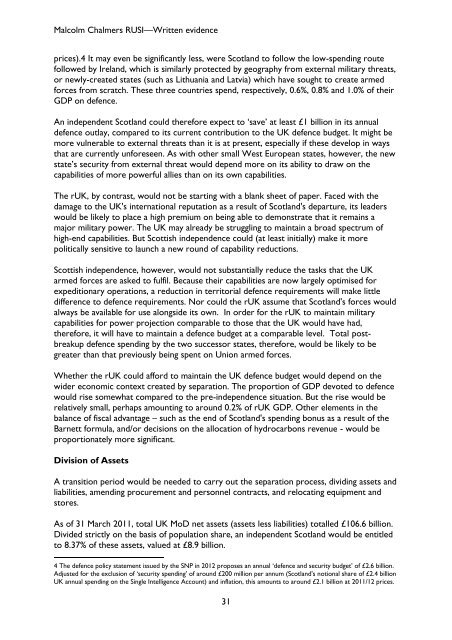SELECT COMMITTEE ON ECONOMIC AFFAIRS - Parliament
SELECT COMMITTEE ON ECONOMIC AFFAIRS - Parliament
SELECT COMMITTEE ON ECONOMIC AFFAIRS - Parliament
Create successful ePaper yourself
Turn your PDF publications into a flip-book with our unique Google optimized e-Paper software.
Malcolm Chalmers RUSI—Written evidence<br />
prices).4 It may even be significantly less, were Scotland to follow the low-spending route<br />
followed by Ireland, which is similarly protected by geography from external military threats,<br />
or newly-created states (such as Lithuania and Latvia) which have sought to create armed<br />
forces from scratch. These three countries spend, respectively, 0.6%, 0.8% and 1.0% of their<br />
GDP on defence.<br />
An independent Scotland could therefore expect to ‘save’ at least £1 billion in its annual<br />
defence outlay, compared to its current contribution to the UK defence budget. It might be<br />
more vulnerable to external threats than it is at present, especially if these develop in ways<br />
that are currently unforeseen. As with other small West European states, however, the new<br />
state’s security from external threat would depend more on its ability to draw on the<br />
capabilities of more powerful allies than on its own capabilities.<br />
The rUK, by contrast, would not be starting with a blank sheet of paper. Faced with the<br />
damage to the UK's international reputation as a result of Scotland's departure, its leaders<br />
would be likely to place a high premium on being able to demonstrate that it remains a<br />
major military power. The UK may already be struggling to maintain a broad spectrum of<br />
high-end capabilities. But Scottish independence could (at least initially) make it more<br />
politically sensitive to launch a new round of capability reductions.<br />
Scottish independence, however, would not substantially reduce the tasks that the UK<br />
armed forces are asked to fulfil. Because their capabilities are now largely optimised for<br />
expeditionary operations, a reduction in territorial defence requirements will make little<br />
difference to defence requirements. Nor could the rUK assume that Scotland's forces would<br />
always be available for use alongside its own. In order for the rUK to maintain military<br />
capabilities for power projection comparable to those that the UK would have had,<br />
therefore, it will have to maintain a defence budget at a comparable level. Total postbreakup<br />
defence spending by the two successor states, therefore, would be likely to be<br />
greater than that previously being spent on Union armed forces.<br />
Whether the rUK could afford to maintain the UK defence budget would depend on the<br />
wider economic context created by separation. The proportion of GDP devoted to defence<br />
would rise somewhat compared to the pre-independence situation. But the rise would be<br />
relatively small, perhaps amounting to around 0.2% of rUK GDP. Other elements in the<br />
balance of fiscal advantage – such as the end of Scotland's spending bonus as a result of the<br />
Barnett formula, and/or decisions on the allocation of hydrocarbons revenue - would be<br />
proportionately more significant.<br />
Division of Assets<br />
A transition period would be needed to carry out the separation process, dividing assets and<br />
liabilities, amending procurement and personnel contracts, and relocating equipment and<br />
stores.<br />
As of 31 March 2011, total UK MoD net assets (assets less liabilities) totalled £106.6 billion.<br />
Divided strictly on the basis of population share, an independent Scotland would be entitled<br />
to 8.37% of these assets, valued at £8.9 billion.<br />
4 The defence policy statement issued by the SNP in 2012 proposes an annual ‘defence and security budget’ of £2.6 billion.<br />
Adjusted for the exclusion of ‘security spending’ of around £200 million per annum (Scotland's notional share of £2.4 billion<br />
UK annual spending on the Single Intelligence Account) and inflation, this amounts to around £2.1 billion at 2011/12 prices.<br />
31

















